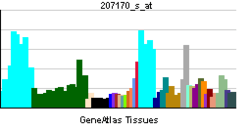LETMD1
LETM1 domain-containing protein 1 is a protein that in humans is encoded by the LETMD1 gene.[3][4][5]
References
- ↑ "Human PubMed Reference:".
- ↑ "Mouse PubMed Reference:".
- ↑ Ko J, Lee YH, Hwang SY, Lee YS, Shin SM, Hwang JH, Kim J, Kim YW, Jang SW, Ryoo ZY, Kim IK, Namkoong SE, Kim JW (Jul 2003). "Identification and differential expression of novel human cervical cancer oncogene HCCR-2 in human cancers and its involvement in p53 stabilization". Oncogene. 22 (30): 4679–4689. doi:10.1038/sj.onc.1206624. PMID 12879013.
- ↑ Qi ZY, Li Y, Ying K, Wu CQ, Tang R, Zhou ZX, Chen ZP, Hui GZ, Xie Y (Jun 2002). "Isolation of novel differentially expressed genes related to human glioma using cDNA microarray and characterizations of two novel full-length genes". J Neurooncol. 56 (3): 197–208. doi:10.1023/A:1015079705841. PMID 12061725.
- ↑ "Entrez Gene: LETMD1 LETM1 domain containing 1".
Further reading
- Maruyama K, Sugano S (1994). "Oligo-capping: a simple method to replace the cap structure of eukaryotic mRNAs with oligoribonucleotides". Gene. 138 (1–2): 171–174. doi:10.1016/0378-1119(94)90802-8. PMID 8125298.
- Suzuki Y, Yoshitomo-Nakagawa K, Maruyama K, et al. (1997). "Construction and characterization of a full length-enriched and a 5'-end-enriched cDNA library". Gene. 200 (1–2): 149–156. doi:10.1016/S0378-1119(97)00411-3. PMID 9373149.
- Strausberg RL, Feingold EA, Grouse LH, et al. (2003). "Generation and initial analysis of more than 15,000 full-length human and mouse cDNA sequences". Proc. Natl. Acad. Sci. U.S.A. 99 (26): 16899–16903. doi:10.1073/pnas.242603899. PMC 139241
 . PMID 12477932.
. PMID 12477932.
- Ko J, Shin SM, Oh YM, et al. (2004). "Transgenic mouse model for breast cancer: induction of breast cancer in novel oncogene HCCR-2 transgenic mice". Oncogene. 23 (10): 1950–1953. doi:10.1038/sj.onc.1207356. PMID 14691448.
- Ota T, Suzuki Y, Nishikawa T, et al. (2004). "Complete sequencing and characterization of 21,243 full-length human cDNAs". Nat. Genet. 36 (1): 40–45. doi:10.1038/ng1285. PMID 14702039.
- Jung SS, Park HS, Lee IJ, et al. (2006). "The HCCR oncoprotein as a biomarker for human breast cancer". Clin. Cancer Res. 11 (21): 7700–7708. doi:10.1158/1078-0432.CCR-04-2609. PMID 16278390.
- Cho GW, Shin SM, Namkoong H, et al. (2007). "The phosphatidylinositol 3-kinase/Akt pathway regulates the HCCR-1 oncogene expression". Gene. 384: 18–26. doi:10.1016/j.gene.2006.07.006. PMID 16949218.

 . PMID 12477932.
. PMID 12477932.